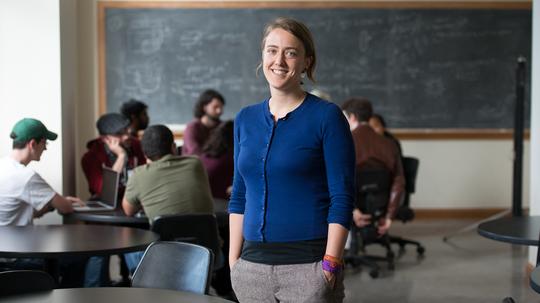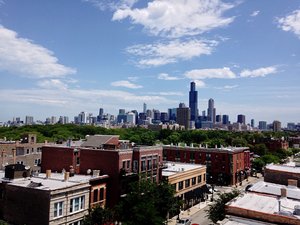
This is the first post in our new 'Chicago Women in STEM' series
It was the “cool projects” in high school physics class that allowed Angie to discover her love for science, but it was the encouragement of her physics teacher to pursue her interest that guided her into a career in STEM education and research.
Since then, she’s been involved in various initiatives to address racial and gender inequality in STEM, and is on a mission to make college physics education more supportive in general.
Angie’s story reinforces a simple truth: a little support and encouragement can go a long way.
Nicole Vasquez: What is your current title?
Angie Little: Owner, Angela Little LLC (Chicago, IL); Researcher, Michigan State University; Visiting Assistant Research Scientist, University of Maryland
Tell me about your work.
I conduct research, produce multimedia, and develop programs that focus on making college physics education more supportive and more equitable. I research the process by which students taking their first college physics course come to believe they are capable in physics. This involves interviewing students about their experiences in physics. It also involves thinking about how to design educational environments that function as supportive communities.
How did you first get involved in STEM? What were the first steps you took?
Neither of my parents are in STEM, so it is really to the credit of my awesome high school physics teacher that I ended up in physics. His name is Michael Lampert. He had us do really cool projects, like build solar-powered cars. And he encouraged me to consider majoring in physics. I had some difficult family things going on during my senior year in high school, when I was taking physics, and he was willing to let me make up exams and turn things in late. So I also credit his willingness to be flexible to my ability to continue going on in physics.
What do you love about STEM?
In college, I fell in love with the math underlying physics. I thought it was really cool and beautiful that elegant math could predict certain properties like the mass and spin of fundamental particles. As a physics graduate student, I developed a better understanding of physics modeling as a process of breaking down and understanding complex problems. Today, my research is in physics education, but the skills of looking at a really complicated phenomenon and breaking it down to model and understand it is really fun.
For you, what is the most beneficial part of being a woman in STEM?
As a Chinook Tribal member and a woman, and without having had parents with Ph.D.'s or STEM-related jobs, I think I can bring some outsider perspective to support STEM, physics especially, to be a better place for folks from all backgrounds.
What is the most difficult part of being a woman in STEM?
The U.S. has a lot of racial and gender stereotypes about intelligence, as well as more general racial and gender (and other) biases, so it sucks to have to feel like you’re always pushing back on that.
How are you working to overcome these inequality issues in STEM?
When I was a physics graduate student at UC Berkeley, I co-founded a program called The Compass Project. We wanted to create an educational program that was a supportive community, particularly for those with various marginalized identities. And we wanted to bring freshman students into doing what’s really cool about physics early on.
We started out creating a summer program for incoming freshman physical science majors. It was a lovely project to be a part of. So many graduate and undergraduate students collaborated on it together. We also won some awards! The American Physical Society (our national physics organization) gave us the 2012 Award for Improving Undergraduate Physics Education. There are now 8 sites across the country running their own student support programs with Compass-inspired elements (as well as their own awesome things). We won an NSF grant last year to form a national network called The Access Network. It’s really given me hope in the possibility of national change that grows out of smaller, local efforts.
What tools or resources have been most helpful for you?
I have been lucky enough to find like-minded friends and colleagues who care about the same things I do: making physics more equitable and creating supportive educational communities. These people give me critical feedback on my work and ideas and also support me more generally. I think a network of people who can give you feedback is one of the most key things. And finding people you feel like you can really connect to at a personal level helps in feeling a sense of belonging.
What do you recommend for someone looking to get involved in STEM?
I would recommend kids or adults get involved in something project-based. I would look for a community where you can take on a project, get peer and mentor feedback, and do something you care about. I think there’s some pretty cool meetup groups for those interested in coding for social good, for instance.
How did other people help you in your journey?
Oh gosh, so many people helped me on my journey it’s ridiculous. I already mentioned my high school physics teacher. The physics department at Seattle Pacific University, where I got my undergraduate degree in physics, was a lovely community. Faculty mentors supported me in physics understanding, but also in life. If I started telling you about all the people who helped me through graduate school and beyond we’d be here for too long!
How else can other people help women to get involved in STEM?
I think it’s particularly important to consider women of color in STEM. If an educational program is founded by white folks and doesn’t think critically about how to partner with communities of color, it’s likely that the program is mainly going to reach white women only. Chicago is so segregated that I think this is particularly important in Chicago. For instance, a UCLA Civil Rights Project press release in 2014 noted, “Segregation is by far the most serious in the central cities of the largest metropolitan areas; the states of New York, Illinois, and California are the top three worst for isolating Black students.”
Chicago State University, where my spouse is a physics faculty member, is graduating some of the largest numbers of black women physics majors in the country and yet the school has been deeply affected by state funding cuts. So fighting for the educational institutions that serve women of color, people of color, is particularly key, I think. I also think that people who want to “help” need to make sure they engage in self-education in history and bias and systemic -isms. It’s not just about helping others, but growing ourselves. For instance, I often find that people don’t know a lot of Native Americans and that our U.S. K-12 history lessons typically place Native American history in the background. Even as a Chinook Tribal member, I’ve personally had to engage in a ton of self-education to even know my own history and the history of indigenous peoples. If folks don’t know many Native Americans, I often recommend they follow Matika Wilbur’s Project 562 or listen to the NextGenNative Podcast. It takes active work to unlearn the stereotypes we’re all steeped in.
What does someone need to get involved in STEM? Any advice you can share based on your own personal experience?
I would encourage college students specifically to find a STEM community as quickly as possible. Sometimes there are summer programs with really cool project-based curriculum that you can sign up for before the semester starts. Sometimes there are courses you can take your first year to do mentored science research with other excited students. Education research shows that community and collaboration are key to STEM success. There’s some really great programs out there.
What are your hopes for the future of STEM?
I hope STEM puts a greater focus on ethics.
What are your own future goals?
Right now my work is mainly university research with a little bit of audio production. I would like to grow the audio production side of what I do. I really enjoy getting to produce pieces and perform interviews that we can share out publicly to help other people. I was part of the 2015 Vocalo Storytellers Workshop and that experience really fostered my interest in audio production.
Describe yourself in a few sentences.
I’m someone who enjoys finding connections across boundaries. I’ve always felt like an interdisciplinary kind of person. I think audio production is so cool because it allows you to bring together people and ideas who might not otherwise meet. For instance: maybe you’re someone in college physics attempting to collaborate with other people to do a difficult thing. Maybe there’s some people in college math or at public science museums that are doing something similar and you could learn from them. But how will you find out that these other people exist? That’s the role I like to fill. I can go talk to those other people and help make a connection.
How can people connect with you, hire you, or learn more about you?
My website is www.angielittle.com, and my Twitter is @SFOregonian
(Photo credit Matt Beardsley)








